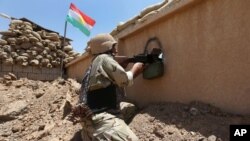Kurdish forces launched an operation to retake the town of Sinjar in northwest Iraq on Wednesday after coalition planes pounded Islamic State (IS) positions overnight, Kurdish officials said.
The Peshmerga fighters made gains against IS throughout the day, the officials said, driving the militants out of at least eight sub-districts in the Zumar area, east of Sinjar.
If the Peshmerga succeeded in recapturing the town, it would open up a corridor to Sinjar mountain, where hundreds of minority Yazidis have been besieged by IS militants since August.
It would also be a symbolic victory for the Kurds, whose reputation as fearsome warriors was bruised after Islamic State overpowered the Peshmerga in Sinjar and killed or captured hundreds of Yazidis.
“At 8:00 this morning the ground offensive began to liberate Sinjar town,” said one official in the Kurdish region's security council, adding that coalition planes had bombed the area for several hours beforehand.
“There's evidence that a lot of IS fighters abandoned their weapons and fled the area.”
Several other Kurdish security officials gave similar accounts.
Preventing a massacre
U.S. President Barack Obama cited the duty to prevent an impending massacre of Yazidis by Islamic State militants as one of the main reasons for authorizing the first airstrikes in Iraq this summer.
Since then, Kurdish Peshmerga forces have regained most of the ground they lost to Islamic State in northern Iraq, but Sinjar's awkward geography, out on a limb to the west, has made it difficult to penetrate.
The road through Sinjar is an important supply route for Islamic State militants between Mosul and neighboring Syria.
Kurdistan's security council said in a statement information from the front line suggested more than 80 militants had been killed in the offensive so far. The number of casualties among the Peshmerga was not known.
Morale remains high as the Peshmerga continue to make advances against ISIS,” the statement read.
In London, the Kurdistan Regional Government's top diplomat told Reuters Kurdish armed forces had been coordinating with Iraqi Shi'ite militias in the fight against Islamic State.
“In certain areas, especially in Diyala province where there are other forces on the ground, there has been some coordination, but I don't hide it and there has been some tension as well,” said Falah Mustafa Bakir, head of the KRG's department of foreign relations.





